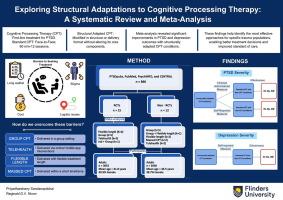Exploring Structural Adaptations to Cognitive Processing Therapy: A Systematic Review and Meta-Analysis
IF 3.8
2区 心理学
Q2 PSYCHIATRY
引用次数: 0
Abstract
In the evolving field of psychological interventions for posttraumatic stress disorder (PTSD), Cognitive Processing Therapy (CPT) has emerged as a first-line treatment, backed by robust empirical evidence. Despite the proven efficacy of CPT in improving PTSD symptoms, individuals face significant barriers when seeking treatment. To overcome these challenges, CPT has undergone testing in diverse settings, accompanied by structural modifications deviating from its commonly delivered format of weekly (or bi-weekly) face-to-face contact, including changes in delivery method, length or intensity of sessions, or format (e.g., group). We conducted a systematic review and meta-analysis to assess the effectiveness of these structural adaptations within CPT for treating PTSD. Fifteen randomized controlled trials (RCTs) and 12 non-RCTs were included for the review. The meta-analysis of the 15 RCTs revealed significant improvements in PTSD and depression outcomes with structural adaptations of CPT. Generally, no significant differences were found when comparing these adaptations with standard CPT or non-CPT treatments, although this is accompanied by the caveat of likely modest power for subanalyses involving different comparator types. The findings suggest that adapting the delivery of CPT typically yields similar outcomes in PTSD symptom improvement as standard CPT and confirms its flexibility in addressing barriers to PTSD treatment access. Limitations and future directions are discussed.

探索认知加工治疗的结构适应:系统回顾和荟萃分析
在不断发展的创伤后应激障碍(PTSD)的心理干预领域中,认知加工疗法(CPT)已成为一线治疗方法,并有强有力的经验证据支持。尽管CPT在改善PTSD症状方面已被证实有效,但个体在寻求治疗时仍面临重大障碍。为了克服这些挑战,CPT已经在不同的环境中进行了测试,同时对其结构进行了修改,偏离了每周一次(或两周一次)面对面接触的常见交付形式,包括交付方法、会议长度或强度或格式(例如,小组)的变化。我们进行了系统回顾和荟萃分析,以评估CPT中这些结构适应治疗PTSD的有效性。纳入了15项随机对照试验(rct)和12项非rct。对15项随机对照试验的荟萃分析显示,CPT的结构适应性显著改善了PTSD和抑郁症的预后。一般来说,当将这些适应性与标准CPT或非CPT治疗进行比较时,没有发现显着差异,尽管这伴随着涉及不同比较物类型的亚分析可能适度的警告。研究结果表明,适应CPT的交付通常在PTSD症状改善方面产生与标准CPT相似的结果,并证实了其在解决PTSD治疗障碍方面的灵活性。讨论了局限性和未来发展方向。
本文章由计算机程序翻译,如有差异,请以英文原文为准。
求助全文
约1分钟内获得全文
求助全文
来源期刊

Behavior Therapy
Multiple-
CiteScore
7.40
自引率
2.70%
发文量
113
审稿时长
121 days
期刊介绍:
Behavior Therapy is a quarterly international journal devoted to the application of the behavioral and cognitive sciences to the conceptualization, assessment, and treatment of psychopathology and related clinical problems. It is intended for mental health professionals and students from all related disciplines who wish to remain current in these areas and provides a vehicle for scientist-practitioners and clinical scientists to report the results of their original empirical research. Although the major emphasis is placed upon empirical research, methodological and theoretical papers as well as evaluative reviews of the literature will also be published. Controlled single-case designs and clinical replication series are welcome.
 求助内容:
求助内容: 应助结果提醒方式:
应助结果提醒方式:


